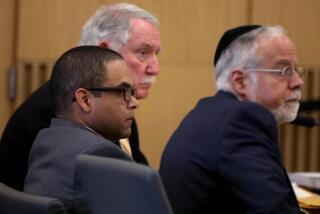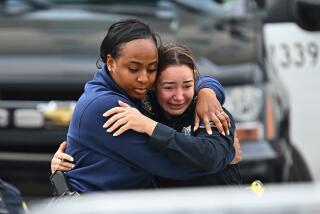Did lyrics inspire killing of police?
The debate over the social impact of gangsta rap music moves to a Milwaukee courtroom Wednesday, when two Wisconsin minors will be charged with murder in the country’s second case of rap allegedly inspiring the killing of a police officer.
The case involves two teens who told authorities they plotted a Sept. 7 sniper attack on a police van “because of a Tupac Shakur record that talks about killing the police.” The assault resulted in the shooting death of 31-year-old Milwaukee Police Officer William A. Robertson.
The 17-year-old defendants, Curtis Lee Walker and Denziss Jackson, will be tried as adults in a case that is expected to reach trial before the end of the year. They have been held without bail at the Milwaukee County Children’s Court Center since their arrest and were unavailable for comment.
Assistant Dist. Atty. Mark Williams declined comment on the case, but sources in the Milwaukee County Homicide Unit said Shakur’s violence-laced rap music will play a pivotal role in the prosecution’s attempt to establish a motive for the first-degree “intentional” homicide.
Walker, the alleged trigger man, told the police that Shakur’s angry lyrics on South Central Cartel’s album “ ‘N Gatz We Truss” “geeked him up” to stalk the officer, according to his court-appointed attorney Ann T. Bowe.
“The violent anti-police lyrics appear to have acted as command hallucinations which influenced his behavior,” said Bowe, whose client has a six-year history of drug, burglary and weapons offenses. “This young man insists that certain passages in these songs are so much a part of his consciousness that it was as if they just kept playing over and over in his head that night.”
According to court records, Walker told police he hid in a vacant field for 40 minutes with a loaded weapon waiting for a police vehicle to pass by. After receiving a signal from Jackson that a police vehicle was approaching, Walker traced the movement of the police van in the scope of his .308 rifle and then fired a single shot.
The bullet ripped through the rear of the van and struck Robertson, who died minutes before reaching the hospital. The two youths were arrested after a 30-hour sweep of the neighborhood.
This is the second criminal case in which Shakur’s music has been blamed for inciting the murder of an officer--and it will most certainly renew criticism of the record industry and rekindle the free-speech debate over violent lyrics.
Last year, an Austin jury rejected a similar defense proposed by Ronald Ray Howard, a 19-year-old car thief who has been sentenced to die for the slaying of a Texas state trooper. Howard had claimed that “cop-killing” songs on Shakur’s “2PACALYPSE NOW” album influenced his actions.
*
While that case remains on appeal, a multimillion-dollar civil suit filed by the Texas trooper’s widow against Shakur and his Interscope Records, a Time Warner subsidiary, is scheduled to go to trial in October, 1995. The suit charges that the label and the rap artist were “grossly negligent” in manufacturing and distributing music that incited “imminent lawless action.”
In the Milwaukee case, the officer’s widow, who is pregnant with twins, could not be reached for comment. Police sources said she has not indicated whether she intends to file a civil suit.
This is the latest legal controversy surrounding Shakur, 23, who was convicted in L.A. seven months ago of battery and possessing a loaded and concealed firearm.
Last week, Atlanta prosecutors dropped aggravated assault charges against Shakur, dismissing a case that stemmed from a 1993 incident in which Shakur exchanged gunfire with two off-duty police officers. He will stand trial next month in New York for allegedly holding a woman down while his friends sodomized her.
On Sept. 3, police blamed Shakur for a disturbance that broke out at a Milwaukee rap festival when one of his security guards allegedly brandished a gun and frightened concert-goers during his performance. Murder defendants Walker and Jackson have told authorities they began plotting to kill a police officer after Shakur’s concert in Milwaukee--just days before the homicide occurred.
Shakur could not be reached for comment, but his attorney, Chokwe Lumumba, characterized the accusations as “ridiculous.”
*
“Tupac is an artist, and his work is social commentary,” Lumumba said. “It’s unfortunate when anybody is killed, but Tupac has never told anybody to shoot a policeman. It’s true that he raps about problems with the police, but those problems existed long before he was even born.”
A growing number of black church leaders, feminists and politicians have recently begun to call for the government to ban the sale of gangsta rap to minors.
Dr. C. DeLores Tucker, chair of the Washington-based Political Congress of Black Women--who encouraged African American lawmakers to convene anti-gangsta rap hearings on Capitol Hill this year--said she hoped Robertson’s slaying would serve as a warning to the record industry.
“This case confirms what many of us have long been saying: that gangsta rap encourages vulnerable youngsters to commit horrible acts of violence,” Tucker said. “Gangsta rap may not be the root cause of the violence, but it’s dangerous because it encourages young people to try to heal their pain in violent ways.”
More to Read
Start your day right
Sign up for Essential California for news, features and recommendations from the L.A. Times and beyond in your inbox six days a week.
You may occasionally receive promotional content from the Los Angeles Times.






